- Home
- Linda Lael Miller
Springwater Wedding Page 5
Springwater Wedding Read online
Page 5
Maggie headed for the kitchen. The chrome trim on the antique cookstove gleamed, thanks to a lot of elbow grease. “Can I get you something? A cup of herbal tea, maybe, or some water?”
Cindy nearly smiled, though not quite. “Do you have any diet cola?”
Maggie went to the refrigerator, which probably dated back to the fifties, and pulled out a can of cola. “I’m afraid there isn’t any ice,” she said, after checking the trays in the temperamental old freezer.
“That’s all right,” Cindy said gravely. Her eyes were fastened on the cola as Maggie brought it to the table and set it down in front of her. “Thanks,” she added, opening the can and taking a long, thirsty drink.
Maggie sat across the table, hands folded. “You’re welcome.”
“About the job—”
Maggie had not intended to hire anyone until she actually opened her doors for business, but that didn’t seem practical, considering all she had to do if she wanted to accept paying guests by Founders’ Day, just a month away. Cindy wasn’t up to any sort of heavy work, but she could probably manage a lot of other tasks, such as running errands and making beds. “It would be part-time at first,” Maggie heard herself say.
Eagerness flickered in Cindy’s haunted eyes. “That’s O.K.,” she said quickly. “I’ve got to look after the trailer and everything anyhow.”
“What about school?”
Cindy lowered her gaze. “I had to quit,” she said miserably. She looked at Maggie squarely then, and there was pride in her face. “But I’m smart. No matter what my dad says, I’m real smart.”
Maggie nodded. “Of course you are,” she said. “Do you know how to use a computer?”
For the first time, Cindy smiled full out. It was dazzling. “I took some classes at school,” she said.
“Good,” Maggie said, smiling. She’d brought her personal system with her from Chicago and set it up in the tiny office off the Station kitchen, once a bedroom. “Maybe you can show me a thing or two. Can you start right away?”
Cindy looked as though she might surge to her feet on a swell of delight. “Tomorrow? Eight o’clock?”
“Nine will be early enough,” Maggie said. “It’s minimum wage at first—”
“I’ll be here before nine,” Cindy promised, with spirit. “And thank you.” She rushed over to Maggie on an impulse, took both her hands, and squeezed them hard. “Oh, thank you. You won’t be sorry for hiring me, I promise.”
Maggie smiled. “I’m sure I won’t,” she said. “See you tomorrow.”
Cindy nodded and dashed out, as though she couldn’t wait to start getting ready.
Fifteen minutes later, when Maggie had set Sadie on one of the trestle tables to brush her teeth, a task she regularly undertook, J.T. startled her with a light rap at the open door and a low chuckle.
“Must be hell to floss,” he observed.
Maggie’s face burned. What was it about J. T. Wainwright that made her feel as though she’d regressed to preadolescence in the space of a heartbeat? “What do you want?” she demanded, and instantly regretted the sharpness of her tone.
He took his hat off, hung it on one of the pegs next to the door, as many, many men had done before him. “I hope that isn’t your official greeting,” he said. “You’ll be out of business in a week if it is.”
Maggie’s response cost her dearly. “I’m sorry,” she said. He’d said he’d like to see the Station, hadn’t he? And now here he was. Mustn’t read too much into it.
“I guess brushing a dog’s teeth takes a toll on a person,” J.T. allowed, his dark eyes twinkling.
Maggie laughed, put aside the special toothbrush and poultry-flavored paste, and went to the sink to wash her hands. “You came for the nickel tour,” she said.
He inclined his magnificent head, and his slow, lingering gaze pulled sweetly at all of Maggie’s nerve endings. “That’s one reason,” he answered.
3
“You’ve got mail!” exulted a familiar electronic voice from somewhere behind Purvis Digg’s computer screen. He set aside the long list of reports he’d been going over for the past few hours: cattle stolen, a few here and a few there, all around Springwater, chemicals poured into the Kilpatricks’ well, tires slashed on trucks and tractors, a minor but nonetheless disturbing burglary over at the high school.
Seated at his desk in his lonely office, Purvis was glad to take a break. He rubbed his hands together, took a slurp of instant coffee from a mug he’d bought at a garage sale sometime in the seventies, and reached for the mouse to click on the mailbox icon. The usual string of junk messages arose, and Purvis scrolled down, deleting as he went, until—hallelujah, there it was—he came to “Cowgirl243–Hey, Lawman.”
Beaming, he opened the attached message. “Ok, ok, you’ve convinced me. I’ll meet you for coffee Thursday night. I get out of my meeting at 8:30. Is that too late? Flo’s Diner is just across the street. Ever been there? Keep smilin’, Cowgirl.”
Purvis flexed the fingers of both hands. “I’ll see you at Flo’s, 8:35, on Thursday. I’ll be the guy standing on the sidewalk, wearing the badge. Don’t stand me up. Lawman.” He hit “send” and was logging off when J.T. came through the doorway, framed by a halo of early-morning sunlight. He wasn’t wearing the badge Judge Calloway had given him, but with the stubborn types like J.T. you had to be grateful for every concession, however small. He’d taken the oath, albeit reluctantly, and he was here.
That, for the moment, was good enough for Purvis.
“Morning,” J.T. said. He was dressed for the range in old jeans, a western shirt that might have come from the bottom of a rag bag, and one of Jack Wainwright’s hats. Purvis recognized it right off and felt a pang of nostalgia. A day never passed that he didn’t miss his good friend.
“There’s some coffee over there,” Purvis said, indicating the small, cluttered table where he kept the makings of java.
J.T. shook his head, grinning. “Thanks,” he said, “but no thanks.” He hung his hat on the peg, next to Purvis’s own. He nodded toward the computer. “You surfing the Internet on company time, old buddy?”
Purvis felt a flush climb his neck; he knew J.T. was only ribbing him, but he took his responsibilities seriously and worked hard at his job. Fact was, there was a lot of waiting around involved, and not being much of a reader, Purvis liked to pass the time either playing computer games or checking out various law enforcement Web sites. The FBI, now, they had a dandy. “For me,” he said, “company time is twenty-four-seven. You ready to dabble in some police work?”
J.T. dragged up a chair and sat down facing Purvis’s desk. He shoved a hand through his hair and sighed. “God knows, I’ve got nothing better to do,” he drawled, hoisting his right foot up to rest on his left knee. He looked like the genuine article, Purvis thought, a real cowboy lawman, right out of Springwater’s colorful history.
“Heard you hired yourself a ranch hand,” Purvis said, settling back, his hands cupped behind his head. “Look out. Pretty soon, you’re going to have a real cow outfit going out there again. Might raise some ghosts.”
“Ghosts” was a poor choice of words, Purvis realized, when he saw a muscle bunch along J.T.’s jawline. He hadn’t meant to remind him of Jack’s death, but then, it was probably never far from his mind anyway. It had to bother him even more than it did Purvis that they’d never found the son-of-a-bitch who’d gunned Jack Wainwright down in cold blood.
J.T. said nothing.
Purvis smiled, just to lighten the mood a bit. It was the least he could do, he figured, since he’d been the one to bring up the unfortunate topic in the first place. “You made a good choice, picking that Raynor kid for the job. He’s a hard worker and keeps his nose clean. Hasn’t been easy, I’m sure, coming from a background like his.”
J.T. heaved a sigh. It was plain enough that he’d rather be digging post holes, mucking out stalls, or nailing shingles on a barn roof, which just went to show that he really did have an
aversion to police work. Purvis reckoned a few years pulling homicide detail in a place like New York City would do that to just about anybody, but at the same time, he was desperate enough to hold J.T. to his promise.
“Where do you suggest we start this investigation?” J.T. asked.
“That’s the hell of it,” Purvis replied. “Until they make a move, we’re pretty much stuck, far as I can see.”
“We could set a trap,” J.T. said thoughtfully. “Bait it with cattle.”
“Where we gonna get beef?” Purvis asked. The ranchers around Springwater were pretty desperate to put an end to the rustling and all the rest, but he doubted they’d be inclined to lend out the seventy to a hundred head of stock they’d need to draw the outlaws’ interest.
“I was thinking of the auction over in Kalispell,” J.T. replied.
“There ain’t enough money in the town treasury for a shopping spree like that, I’ll tell you right now,” Purvis pointed out. His gaze wandered to the computer screen; try though he might to concentrate, half his mind was on Cowgirl243. Hey, Lawman.
“Stay with me, here, Purvis,” J.T. said, snapping him back to attention just like that. “I’m talking about stocking my own range. I’ve already bought several head of cattle as it is, a couple of horses, too. I need more.”
Purvis let out a long breath. “You’re willing to put your own animals at risk for the sake of an investigation?”
J.T. shrugged. “There’s always an element of chance,” he said. “Even without rustlers, a rancher has wolves and coyotes to think about. Not to mention fire, blizzards, droughts, and low prices.”
It was enough to make Purvis wonder why anybody would want to run a ranch, with all those things working against them. There was only one answer: It was in their blood, the way the law was in his. He leaned forward, hands folded on the surface of his desk, and spoke quietly. “If these are the same people behind your dad’s shooting—”
J.T. smiled grimly, and the look in his eyes turned flint hard. “They might be inclined to come after me, too,” he finished, when Purvis’s words fell away. “So much the better.”
Purvis wanted to bring in the bad guys, but something in J.T.’s manner worried him mightily. “Maybe this isn’t such a good idea after all. Everybody around here knows you’ve been deputized. They’re gonna guess what you’re up to right off, and if they had anything to do with Jack’s killing, they might be gunning for you, too.”
“Maybe,” J.T. agreed. “They might also see it as a challenge, like I do. With me, it’s both professional and personal—professional if they’re just a bunch of ordinary thieves. Personal if one of them killed my father.”
Purvis shifted in his chair. If anything happened to J.T., he’d have to take an ample share of the blame. On the other hand, they weren’t going to beat these rustlers out of the brush and into the open by playing it safe, and something sure as hell had to be done before matters went from bad to worse. “Fair enough,” he allowed. “You need any help getting ready?”
J.T. grinned. “You know how to string barbwire?” he asked.
Maggie stood on a stepladder, soapy sponge in hand, washing the log wall of the room she would be occupying as soon as the last spiderweb was gone and the antique lace curtains were hung. The bedstead, a mahogany, intricately carved four-poster, had come down to Maggie as a teenager, along with some of June-bug McCaffrey’s modest jewelry and a few musty remembrance books. It had been in her parents’ guest house since Maggie left for college, and Wes and Reece were bringing it over later, in the back of a borrowed truck.
“… and then he said, ‘That’s one reason,’” she told a blue-jeaned Daphne, who was just handing up a fresh bucket of water.
Daphne’s mouth formed a perfect O. “That’s all? He didn’t elaborate? He just left you hanging there?”
Maggie dunked her sponge with a vengeance, wrung it out, and slapped it against the wall. She’d been unsettled ever since her encounter with J.T. at the Station the day before, when he’d hinted that there was more to his visit than a simple desire to see what she was doing with the old place and then never said another word about it. “That’s right,” she said, scrubbing. “That’s his specialty. Leaving people hanging.”
Daphne laughed, resting her hands on her slender hips and looking up at Maggie with sparkling eyes. “He really got under your skin,” she observed, sounding thrilled with the possibility.
“He did not,” Maggie lied. “I couldn’t possibly care less what
J. T. Wainwright says or does not say.”
“Right,” Daphne said.
Maggie decided it was high time to change the subject. “What do you think of Cindy?” she asked. She’d sent her new employee to the post office a few minutes before, to buy postage for the meter and rent a mailbox under the name Springwater Station.
“Poor kid,” Daphne answered, on a wistful note. “Her father is Odell Hough. Do you remember him?”
Maggie bit her lower lip. There were dozens of Houghs in and around Springwater; some of them were solid citizens, and others were rumored to brew moonshine, live in camper shells with no plumbing, and sleep on bare mattresses. “Not specifically,” she admitted.
Daphne glanced toward the doorway and lowered her voice, even though Cindy couldn’t possibly have stepped into the corridor without raising a noisy greeting from Sadie. “He’s a real creep,” Daphne said. “After his wife died, there were some reports that he was neglecting the children, if not outright abusing them, and the county tried to take them away. He fought it and won, but believe me, I had both those kids in my class and they would have been better off in foster homes.”
Maggie was stricken. “No wonder,” she murmured, thinking of Cindy’s pregnancy and the fact that she’d dropped out of school to get married.
Daphne nodded, and it soon became apparent that her thoughts were taking a similar track. “She wanted to get out of the house. After that shack of Odell’s, that old trailer on the Wainwright place probably looks like a palace.”
Maggie remembered the trailer well enough; it was an ancient one-bedroom thing, the size of a breadbox, and it rattled in every brisk wind. She’d lost her virginity to J.T. there, one spring night when they were seventeen.
It seemed there was no escaping thoughts of J.T., no matter which direction the conversation took.
Daphne said something, peering suspiciously up at her, though Maggie didn’t catch what it was.
The first time was supposed to be painful, Maggie had heard, but when J.T. made love to her that night, so tenderly, so awkwardly, she’d liked it so much that it scared her—
“Mags?” Daphne persisted.
Maggie snapped out of it. The memories had left her with a hot, achy feeling deep between her hip bones. “What?” she countered.
“You were way off in the distance. What were you thinking?”
“None of your business,” Maggie answered sweetly. “By the way, are you here to wash windows or quiz me about my love life?”
Daphne folded her arms and grinned. “Would you ’fess up to anything, if I did?”
Maggie sighed and tried to look stern.
Undaunted, Daphne patted Maggie’s sneakered foot. “Just tell me this, then,” she persisted. “Why don’t you stop pretending and go after that man? It’s obvious you’re crazy about J.T.”
“All right!” Maggie fretted. “There might be a smidgeon of truth in that—I do find J.T.—well—attractive. But he’s still as reckless as he ever was.” She paused, took a breath. “I need structure in my life. I need stability—”
Daphne rolled her eyes. “Where did ‘structure and stability’ get you with Connor?” she reasoned, plainly out of patience. “Take a chance for once, Mags. Live on the edge!”
“I don’t think I know how,” Maggie mused.
“You just close your eyes and leap!”
Maggie grimaced. “Or not.”
Daphne sighed. “What a shame. You and J.T.
practically throw sparks just being in the same room. You’re perfect for each other.”
“No,” Maggie said, resigned, “you and Ben are perfect for each other. J.T. and I are old news. His motto is ‘Damn the Torpedoes, Full Speed Ahead!’ and mine is ‘Better Safe Than Sorry.’ Don’t you see, Daph? We’re just too different.”
“Oh, Mags,” Daphne whispered. “What happened to you? Did Connor hurt you so badly—?”
“Connor didn’t hurt me,” Maggie said quietly. “J.T. did.”
“But—”
Maggie pulled in a deep breath, let it out slowly. “I’m not in the market for a relationship, Daphne,” she said. “Maybe I will be, later, when the Station is up and running. Maybe I’ll meet somebody—somebody I have things in common with—but right now, I just want to play it safe.”
“That can get to be a habit,” Daphne warned. “A bad habit.”
Maggie got down from the ladder, smiled, and hugged her best friend. “Stop worrying about me, O.K.?” she said. “A woman doesn’t need a man to be happy.”
Daphne sighed. “No,” she agreed thoughtfully, “but it certainly helps.”
Before Maggie had to answer, Sadie erupted into a chorus of cheerful barking, and Cindy stepped into the room, back from the post office.
The girl was smiling. “I could do that,” she said, nodding toward the ladder, bucket, and sponge. “Wash the walls, I mean.”
Maggie shook her head. “No ladders, and no reaching over your head,” she said firmly. “It isn’t good for you.”
Cindy was far too young to become a mother, but pregnancy looked good on her nonetheless. She was glowing, and her eyes twinkled. “You sound just like Billy. He’s always telling me to take it easy. I’m not supposed to lift things, or help feed the horses, or anything.”
“Good for Billy,” Daphne said. “Listen to your husband, Cindy.”
Cindy rolled her eyes. “I don’t have much choice. That trailer of ours is so little, we don’t even have to talk. We can hear each other thinking.”

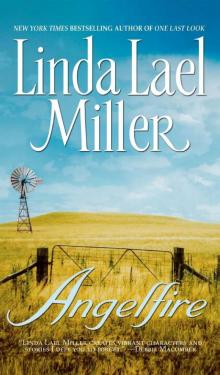 Angelfire
Angelfire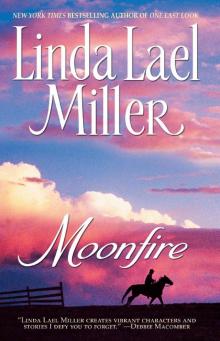 Moonfire
Moonfire The Yankee Widow
The Yankee Widow The Cowboy Way
The Cowboy Way Country Strong--A Novel
Country Strong--A Novel Forever and a Day
Forever and a Day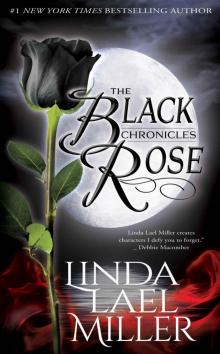 The Black Rose Chronicles
The Black Rose Chronicles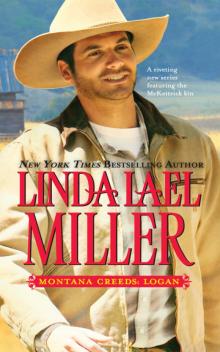 Montana Creeds: Logan
Montana Creeds: Logan My Darling Melissa
My Darling Melissa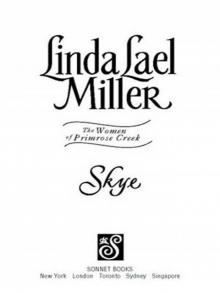 Skye
Skye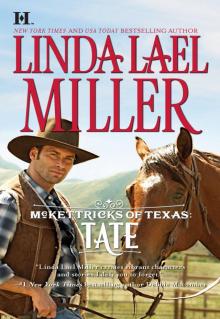 McKettricks of Texas: Tate
McKettricks of Texas: Tate Springwater Seasons
Springwater Seasons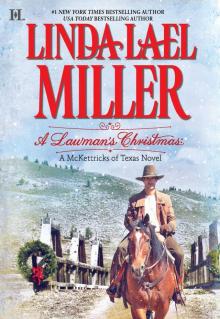 A Lawman's Christmas
A Lawman's Christmas Sierra's Homecoming
Sierra's Homecoming![Parable, Montana [4] Big Sky Summer Read online](http://i1.bookreadfree.com/i/03/22/parable_montana_4_big_sky_summer_preview.jpg) Parable, Montana [4] Big Sky Summer
Parable, Montana [4] Big Sky Summer One Last Weekend
One Last Weekend A Stone Creek Collection, Volume 2
A Stone Creek Collection, Volume 2 Tonight and Always
Tonight and Always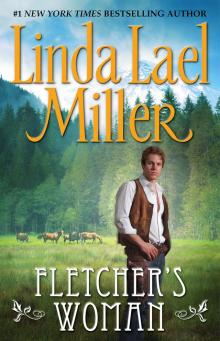 Fletcher's Woman
Fletcher's Woman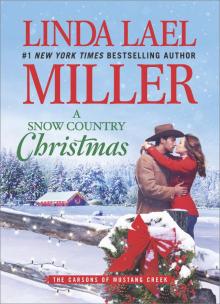 A Snow Country Christmas
A Snow Country Christmas The Last Chance Cafe
The Last Chance Cafe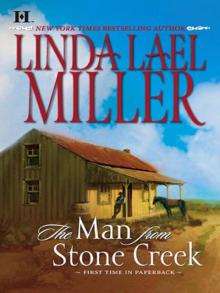 The Man from Stone Creek
The Man from Stone Creek Wanton Angel
Wanton Angel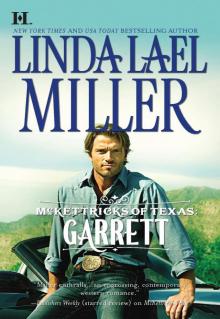 McKettricks of Texas: Garrett
McKettricks of Texas: Garrett Memory's Embrace
Memory's Embrace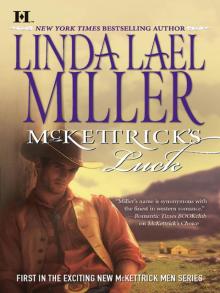 McKettrick's Luck
McKettrick's Luck Pirates
Pirates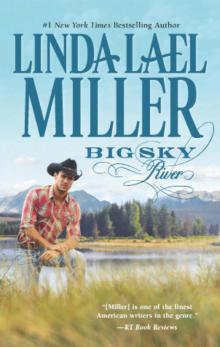 Big Sky River
Big Sky River Willow: A Novel (No Series)
Willow: A Novel (No Series) The McKettrick Legend: Sierra's HomecomingThe McKettrick Way (Hqn)
The McKettrick Legend: Sierra's HomecomingThe McKettrick Way (Hqn) Glory, Glory: Snowbound with the Bodyguard
Glory, Glory: Snowbound with the Bodyguard Two Brothers
Two Brothers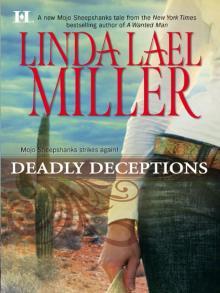 Deadly Deceptions
Deadly Deceptions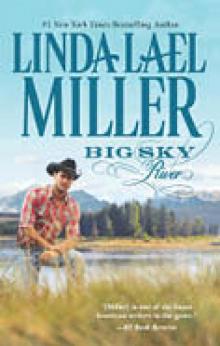 Big Sky Secrets
Big Sky Secrets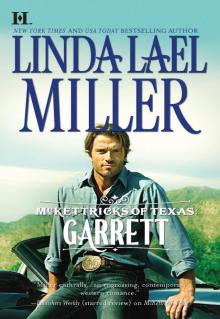 Garrett
Garrett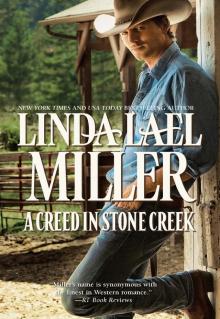 A Creed in Stone Creek
A Creed in Stone Creek Megan
Megan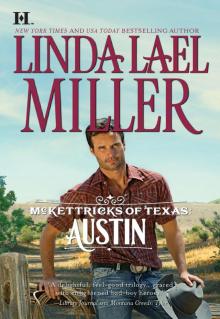 McKettricks of Texas: Austin
McKettricks of Texas: Austin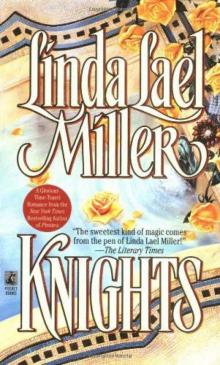 Knights
Knights High Country Bride
High Country Bride More Than Words Volume 4
More Than Words Volume 4 Glory, Glory
Glory, Glory Daring Moves
Daring Moves Lily and the Major
Lily and the Major Courting Susannah
Courting Susannah Banner O'Brien
Banner O'Brien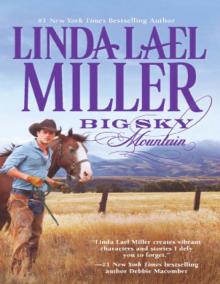 Big Sky Mountain
Big Sky Mountain Linda Lael Miller Bundle
Linda Lael Miller Bundle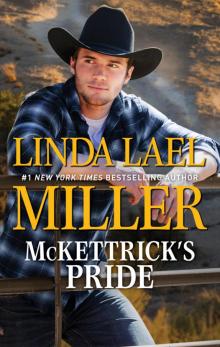 McKettrick's Pride
McKettrick's Pride A Stone Creek Collection Volume 1
A Stone Creek Collection Volume 1 A Wanted Man
A Wanted Man Big Sky Country
Big Sky Country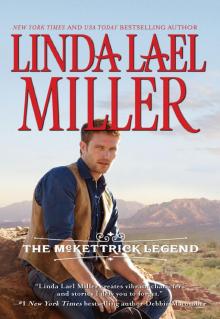 The McKettrick Legend
The McKettrick Legend Christy
Christy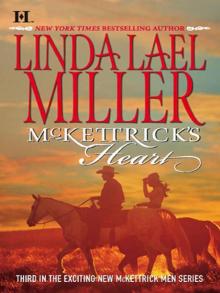 McKettrick's Heart
McKettrick's Heart Resurrection
Resurrection Arizona Heat
Arizona Heat Secondhand Bride
Secondhand Bride Snowflakes on the Sea
Snowflakes on the Sea Montana Creeds: Tyler
Montana Creeds: Tyler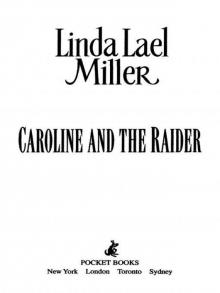 CAROLINE AND THE RAIDER
CAROLINE AND THE RAIDER A Proposal for Christmas: State SecretsThe Five Days of Christmas
A Proposal for Christmas: State SecretsThe Five Days of Christmas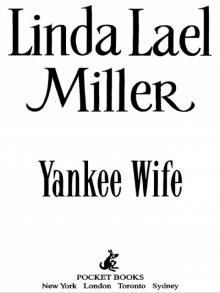 Yankee Wife
Yankee Wife Linda Lael Miller Montana Creeds Series Volume 1: Montana Creeds: LoganMontana Creeds: DylanMontana Creeds: Tyler
Linda Lael Miller Montana Creeds Series Volume 1: Montana Creeds: LoganMontana Creeds: DylanMontana Creeds: Tyler The Christmas Brides
The Christmas Brides McKettricks Bundle
McKettricks Bundle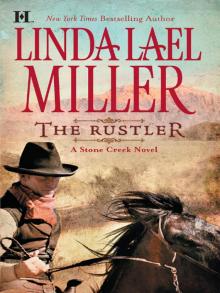 The Rustler
The Rustler Here and Then
Here and Then Only Forever
Only Forever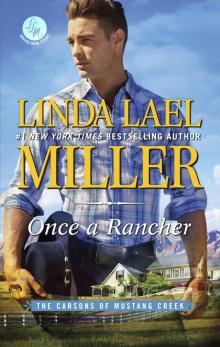 Once a Rancher
Once a Rancher The 24 Days of Christmas
The 24 Days of Christmas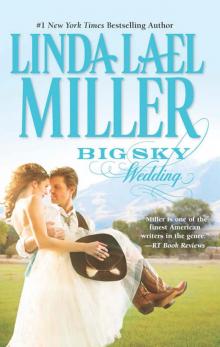 Big Sky Wedding
Big Sky Wedding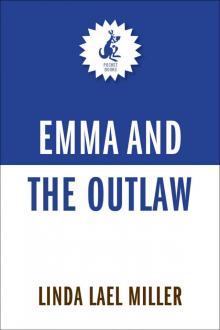 Emma and the Outlaw
Emma and the Outlaw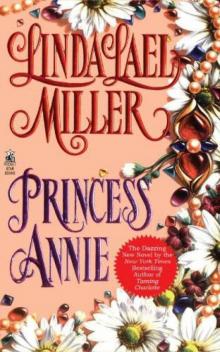 Princess Annie
Princess Annie Wild About Harry
Wild About Harry That Other Katherine
That Other Katherine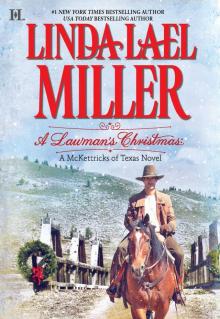 A Lawman's Christmas: A McKettricks of Texas Novel
A Lawman's Christmas: A McKettricks of Texas Novel Just Kate: His Only Wife (Bestselling Author Collection)
Just Kate: His Only Wife (Bestselling Author Collection)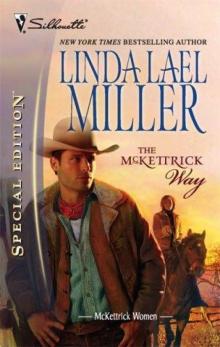 The McKettrick Way
The McKettrick Way Part of the Bargain
Part of the Bargain Taming Charlotte
Taming Charlotte Holiday in Stone Creek
Holiday in Stone Creek One Last Look
One Last Look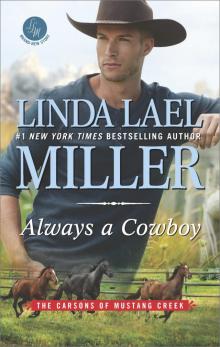 Always a Cowboy
Always a Cowboy Batteries Not Required
Batteries Not Required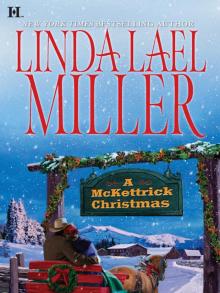 A McKettrick Christmas
A McKettrick Christmas For All Eternity
For All Eternity The Marriage Season
The Marriage Season Corbin's Fancy
Corbin's Fancy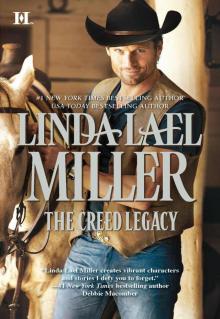 The Creed Legacy
The Creed Legacy Springwater Wedding
Springwater Wedding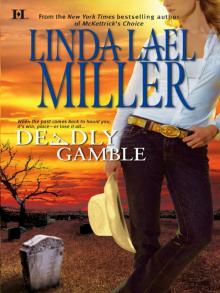 Deadly Gamble
Deadly Gamble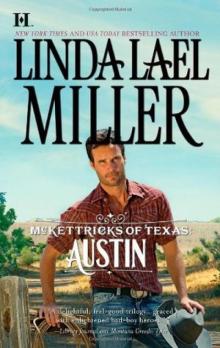 Austin
Austin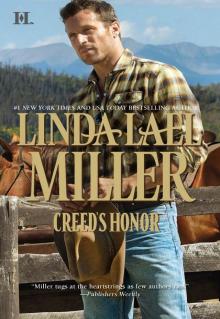 Creed's Honor
Creed's Honor A Creed Country Christmas
A Creed Country Christmas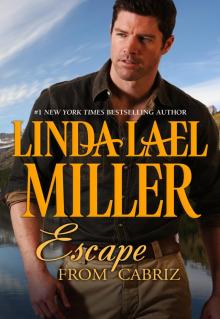 Escape from Cabriz
Escape from Cabriz There and Now
There and Now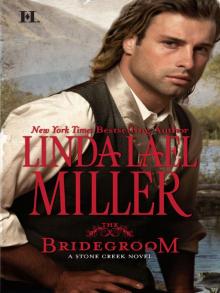 The Bridegroom
The Bridegroom State Secrets
State Secrets Bridget
Bridget